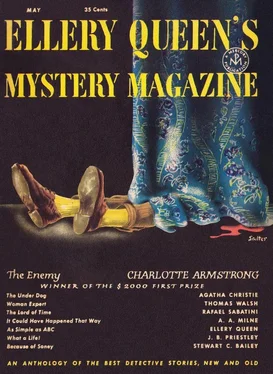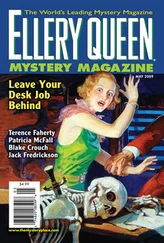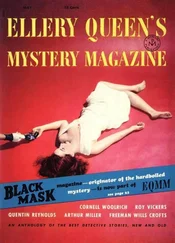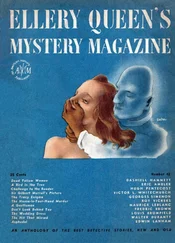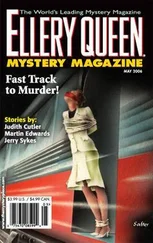Charlotte Armstrong - Ellery Queen’s Mystery Magazine. Vol. 17, No. 90, May 1951
Здесь есть возможность читать онлайн «Charlotte Armstrong - Ellery Queen’s Mystery Magazine. Vol. 17, No. 90, May 1951» весь текст электронной книги совершенно бесплатно (целиком полную версию без сокращений). В некоторых случаях можно слушать аудио, скачать через торрент в формате fb2 и присутствует краткое содержание. Город: New York, Год выпуска: 1951, Издательство: Mercury Publications, Жанр: Детектив, Классический детектив, на английском языке. Описание произведения, (предисловие) а так же отзывы посетителей доступны на портале библиотеки ЛибКат.
- Название:Ellery Queen’s Mystery Magazine. Vol. 17, No. 90, May 1951
- Автор:
- Издательство:Mercury Publications
- Жанр:
- Год:1951
- Город:New York
- ISBN:нет данных
- Рейтинг книги:5 / 5. Голосов: 1
-
Избранное:Добавить в избранное
- Отзывы:
-
Ваша оценка:
- 100
- 1
- 2
- 3
- 4
- 5
Ellery Queen’s Mystery Magazine. Vol. 17, No. 90, May 1951: краткое содержание, описание и аннотация
Предлагаем к чтению аннотацию, описание, краткое содержание или предисловие (зависит от того, что написал сам автор книги «Ellery Queen’s Mystery Magazine. Vol. 17, No. 90, May 1951»). Если вы не нашли необходимую информацию о книге — напишите в комментариях, мы постараемся отыскать её.
Ellery Queen’s Mystery Magazine. Vol. 17, No. 90, May 1951 — читать онлайн бесплатно полную книгу (весь текст) целиком
Ниже представлен текст книги, разбитый по страницам. Система сохранения места последней прочитанной страницы, позволяет с удобством читать онлайн бесплатно книгу «Ellery Queen’s Mystery Magazine. Vol. 17, No. 90, May 1951», без необходимости каждый раз заново искать на чём Вы остановились. Поставьте закладку, и сможете в любой момент перейти на страницу, на которой закончили чтение.
Интервал:
Закладка:
Arrogant, domineering, impatient even, he would move through the press of distinguished suitors, his great head thrown back, his terrible, uncanny eyes at once dazzling and awing those upon whom he fixed them. Waving his short, powerful, jewelled hands in fantastic gestures, he chattered constantly in that queer, inflated jargon of his that was compounded of Italian, Italianate French and scraps of Spanish, a sort of lingua franca that would have been more or less understood in any country where a Romance language was spoken. He was abrupt and harsh of speech and manner, observing few of the amenities that obtained in the polite world which now paid court to him. But as a healer his success was manifest; and not only with malingerers and hypochondriacs, but also with the genuinely afflicted. Sometimes he would display his powers of reading the secrets of a man’s soul, and sometimes he would even foretell a future event.
Very soon the respect commanded for him by the aegis of the Cardinal-Prince was converted by the clear magnitude of his own arts into reverence and even worship. No enemy troubled the serenity of his days until suddenly the Prince de Guémenée, the man whose dishonest extravagances had rendered Cagliostro’s services so timely to the Cardinal, came gliding like a malevolent snake into this Eden.
Monsieur de Guémenée was a hard-bitten man of the world, regarding the Hereafter with a good deal of mistrust, and of the Present accepting no more than those material parts of whose reality his senses enabled him to test the evidences. The charlatanism and quackery which in that disjointed period of transition were rampant in Prance moved him to contempt. That his uncle, the uncle upon whom he was depending for his existence, should be falling a prey to one of these empirics — for that was Monsieur de Guémenée’s view of Count Cagliostro — aroused in him the remorseless anger that is born of selfish fear.
He descended suddenly upon the Château de Saverne with intent to disillusion the Cardinal and send the warlock packing. Armed with something besides indignation and common sense, he never doubted that he should accomplish his object.
He arrived in the dusk of a September day, and, being bidden to supper so soon as he had changed from his travelling-clothes, he must curb until afterwards his agnostic impatience.
It was not necessary that Cagliostro should be pointed out to him among the considerable company at the open table kept by the munificent Cardinal. The man’s dominant air and magnetic personality made him sufficiently conspicuous. Although overdressed — his black satin coat was excessively gold-laced, and he wore with it a red waistcoat — and over-jewelled, and although his table manners left much to be desired, yet he escaped being ridiculous or even vulgar by the majestic assurance of his demeanour.
Observing the spell which the man appeared to cast upon those about him, meeting once or twice and finding himself unable to support the glance of those singularly uncanny eyes, Monsieur de Guémenée began to apprehend that the battle ahead might sternly test his strength.
Nevertheless he engaged it intrepidly with his uncle in the magnificent pillared library whither the Cardinal conducted him after supper.
His Eminence took a seat at his ormolu-encrusted writing-table, whilst his nephew faced him from a tall arm-chair upholstered in red velvet on which was embroidered an R surmounted by a coronet.
Monsieur de Guémenée was approaching thirty. Like his uncle he was tall and slender, and he bore also in his countenance a strong resemblance to the Cardinal, but lacked the Cardinal’s gentle candid air. He sat back, crossed his legs, and plunged straight into the matter.
“I have come, Monseigneur, to talk to you about this man who calls himself Count Cagliostro.”
His Eminence, of imperturbable urbanity, looked mildly at his nephew.
“How should you prefer to call him, Charles?”
“An impudent impostor,” was the downright answer. “A common swindler; a quacksalver whose proper place is on the Pont Neuf; a charlatan who makes a victim of Your Eminence. What his real name may be I have not yet ascertained.”
The handsome Cardinal betrayed no annoyance. But there was some sorrow in his glance. “I could bear with a good grace to be such a victim as Count Cagliostro makes me. I can bear it thankfully even; and so, my dear Charles, should you, considering how much we are likely to owe to him.”
“Ah! And how much is he likely to owe to you by the time he has invaded Paris, as I hear is the intention, under your exalted sponsorship; by the time you have presented him at Court and set him on the way to swindle all the people of our world?”
“You are vulgar and commonplace in your views, Charles. God commiserate me that I should discover it in a man of my own blood.”
Monsieur de Guémenée leaned forward. “Monseigneur, I have been looking into this man’s history.”
“In that case, my dear Charles, perhaps I can add something to the information you already possess. Look at this ring.” He held out a fine white hand on the middle finger of which gleamed a magnificent brilliant carved with the Rohan arms. “That is a gift from Count Cagliostro. And not only a gift, an evidence of his powers. It is a creation of his own. In the laboratory above-stairs I, myself, saw it taken from the crucible in which it was fused by him.”
“Jugglery!” scoffed Monsieur de Guémenée. “Common jugglery. If he can do that, what need to live upon you?”
“He does not live upon me. Here it is he, not I, who is the benefactor. And what of the cures he daily makes upon all-comers, sometimes of maladies accounted mortal? Is that jugglery? And all is done freely, without recompense, for the love of humanity. Is that the way of an impostor, a quacksalver? And then the alms he distributes, the gold he makes. Jugglery? A stupidity of the malicious. For if he is indeed a juggler, he must be the richest juggler that ever lived. Whence does he derive his wealth?”
His Eminence set the question with the air of a man delivering checkmate. But Monsieur de Guémenée had an answer ready.
“I can enlighten Your Eminence upon that, for I have been at pains to inform myself. He derives it from the lodges of so-called Egyptian freemasonry which he has been founding in France and elsewhere; he derives it from the sensation-seeking gulls whom he initiates into these claptrap mysteries and from whom the Grand-Copht, as he calls himself, demands rich fees for his impostures.”
The Cardinal stiffened and sat bolt upright, unable, despite his deep-seated amiability, to restrain resentment.
“If you come to me merely as a retailer of vulgar scandal, of almost blasphemous calumny, I will not listen to you further.”
“A moment’s patience, Monseigneur. There is something else; something you may easily investigate for yourself, and not so easily dismiss. If you will condescend to hear me, I will—”
And then the double-doors were thrown open by a lackey, who entered, ranged himself aside and announced:
“His Excellency, Count Cagliostro.”
Monsieur de Guémenée sank back into his chair with a movement of petulance as the man of marvels came into view. He made a deliberate entrance, grave and masterful, from the carriage of his head to the manner in which he set his feet, and his eyes, the while, were steadily upon the Prince de Guémenée, He had seen the hasty movement and observed now the sullenness which the young man was not concerned to conceal.
As the door closed, he halted, and, maintaining that steady regard under which Monsieur de Guémenée, to his profound annoyance, began to feel uncomfortable, he spoke, subduing his resonant voice.
“If I seem to be inopportune, Monsieur de Guémenée, if I interrupt the criticisms you were about to offer, you have in this more matter for thankfulness than you may suspect.”
Читать дальшеИнтервал:
Закладка:
Похожие книги на «Ellery Queen’s Mystery Magazine. Vol. 17, No. 90, May 1951»
Представляем Вашему вниманию похожие книги на «Ellery Queen’s Mystery Magazine. Vol. 17, No. 90, May 1951» списком для выбора. Мы отобрали схожую по названию и смыслу литературу в надежде предоставить читателям больше вариантов отыскать новые, интересные, ещё непрочитанные произведения.
Обсуждение, отзывы о книге «Ellery Queen’s Mystery Magazine. Vol. 17, No. 90, May 1951» и просто собственные мнения читателей. Оставьте ваши комментарии, напишите, что Вы думаете о произведении, его смысле или главных героях. Укажите что конкретно понравилось, а что нет, и почему Вы так считаете.
